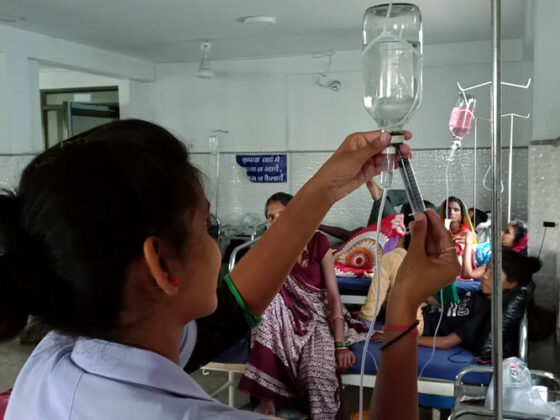Immunotherapy is increasingly being initiated in the month prior to death in patients with stage IV non-small-cell lung cancer, melanoma, and renal cell carcinoma. The US study, published in JAMA Oncology, online January 4, showed the practice was more common at nonacademic and lower-volume health care centres than academic centres, and that nonacademic and lower volume centres have inferior five-year survivals.
“Our study found that in the last 10 years, the initiation of immunotherapy in [what turned out to be] the final month of a patient’s life has significantly increased, accounting for one in 14 immunotherapy treatments overall,” says Sajid Khan, the senior author, who is a surgical oncologist at Yale School of Medicine. The results, he adds, suggest that providers should be more discerning between cases where immunotherapy can extend life and those where it cannot. “What we found we hope will serve as a harbinger for shifts in clinical approach to patients with advanced cancer.”
Over the last decade immune checkpoint inhibitors have revolutionised cancer care. However, in contrast to chemotherapy, which in recent years has seen decreased utilisation at end-of-life, evidence suggests immunotherapy is increasingly being administered near death for patients with cancer. Immunotherapy prescribed near the end-of-life has been associated with increased hospitalisation rates, increased emergency department visits, higher chance of hospital death, decreased hospice enrolment, delayed palliative care referral, financial toxicity, and poor performance status. The investigators hypothesised that the recent rapid adoption of immunotherapy has led to less restrictive patient selection and an increase in patients dying shortly after treatment initiation. “We wanted to identify patient characteristics and factors for end-of-life initiated immunotherapy over the course of time,“ explains Khan.
For the retrospective study, investigators used data from the National Cancer Database to identify patients who had started their first dose of immunotherapy within 30 days of death. Patients surviving longer after initiation of immunotherapy were not included. The study included 242,371 patients: 20,415 with stage IV metastatic melanoma, treated between 2012 and 2019; 197,331 with stage IV non-small-cell lung cancer (NSCLC) treated between 2016 and 2019; and 24,625 with stage IV renal cell carcinoma (RCC) treated between 2016 and 2019. For each separate cancer, the start of the study period was the year immediately following FDA approval of the first immune checkpoint inhibitor for treating stage IV disease. Researchers considered each patient’s age, sex, race, and ethnicity, as well as locations of metastases and the type of medical facility where treatment was given.
Results showed that the patients’ mean age was 67.9 years, with 42.5% aged over 70 years.
- The percentage of patients receiving end-of-life immunotherapy during the study period increased from 0.8% to 4.3% for patients with melanoma; from 0.9% to 3.2% for patients with NSCLC; and from 0.5% to 2.26% for patients with RCC.
- In 2019 more than 1 in 14 immunotherapies (7.3%) were started within the last 30 days of life.
- Treatment at an academic vs nonacademic centre was associated with a reduced risk of end-of-life immunotherapy (OR 0.69, 95%CI 0.65 0.65–0.74, P<0.001), and treatment at a high-volume vs low-volume site was associated with reduced use of end-of-life immunotherapy (OR 0.70, 95%CI 0.65–0.75, P<0.001).
- Across all three types of cancer, patients with more than three sites of distant metastases were 3.8 fold more likely (95%CI 3.1–4.7, P<0.001) to receive end-of-life immunotherapy versus those with only lymph node involvement. The respective ORs for the melanoma, NSCLC, and RCC cohorts were 9.98 (95%CI 4.03–24.67), 3.61 (95%CI 2.87–4.55), and 3.26 (95%CI 1.66–6.40).
- By comparison, academic healthcare centres had 5–9% better absolute five-year survival than nonacademic centres, and high-volume health centres had 4–13% better absolute survival than very-low-volume centres.
- Giving immunotherapy to patients with comorbid conditions occurred more frequently at nonacademic and low-volume hospitals than at academic hospitals. Comorbidities were also associated with increased use of end-of-life initiated immunotherapy. Patients with Charlson-Deyo scores (a measure of comorbidities) of 2 had an OR for end-of-life initiated immunotherapy of 1.36 (95%CI 1.22–1.50; P<0.001). For those with a score of 3 or higher the OR was 1.58 (95%CI 1.42–1.76; P<0.001).
“[The] findings of this cohort study show that the initiation of immunotherapy at the EOL [end-of-life] is increasing over time. Patients with higher metastatic burden and who were treated at nonacademic or low-volume facilities had higher odds of receiving EOL immunotherapy,” conclude the authors.
As a result of the findings, the authors would like to see healthcare providers thinking twice about administering immunotherapy in the setting of metastatic cancer. “Just because it is an option does not always mean it is going to be the right thing. Just questioning a bit carefully about whether or not the patient should receive immunotherapy,” says Khan, in an online interview with JAMA Oncology Author Interviews.
A possible explanation for survival differences between institutions, he goes on to suggest, is the multiple resources available at academic centres and high-volume hospitals. “Our study does not capture the population of patients who were salvaged. Patients are more likely to be on clinical trials at academic centres, and high-volume hospitals. They are more likely to have access to more sophisticated ICUs and resources which allow for salvage of patients not doing well.”
In an accompanying editorial, Michael Hoerger, Navya Nair, and Sonia Malhotra, from Tulane University, New Orleans, write, “Academic and high-volume centers treat with immunotherapy more often and see better survival. Nonacademic and low-volume centers are less likely to treat with immunotherapy, more often initiate it shortly before death, and see lower survival. Such differences in mortality are not merely attributable to immune-related adverse events, which Kerekes [the first author] and colleagues note account for no more than 10% of mortality within 1 month, so other factors are likely to contribute.”
The broader implication of the study, they add, is the need for increased research into reducing healthcare disparities in advanced cancer care. “Specifically, we call for more research that uses prospective designs, aims to understand clinician decision-making surrounding treatment initiation, integrates palliative and supportive care at low-volume and nonacademic centres, and evaluates the success of interinstitutional partnerships,” they write.












